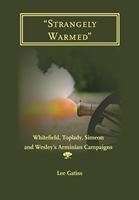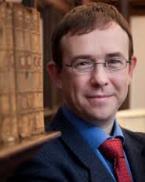It is always delightful to read behind Lee Gatiss, and this new booklet (The St. Antholin Lecture, 2014) is certainly no exception. As the title cleverly implies, Strangely Warmed focuses on the sometimes rather heated controversy over Arminianism in the Anglican Church of 18th century Britain. More specifically, Gatiss investigates John Wesley’s sustained attack against Calvinism, exposes his methods, clarifies some of his related theological distinctives, and sheds new light on a famous controversy – all in the space of under 30 pages. As a historian Gatiss is well-informed, insightful, and judicious, and his new booklet is in every respect a fascinating read. Perhaps its most important contribution is the portrait he paints of Wesley in this controversy – a glimpse of the celebrated Methodist that elsewhere, generally, is rather politely overlooked.
We are happy to have Dr. Lee Gatiss with us again to talk about his subject and his new book.
 Books At a Glance (Fred Zaspel):
Books At a Glance (Fred Zaspel):
First off, especially for those who may be new to this piece of history, tell us briefly what this controversy was all about. What theological issues were involved? What sparked the controversies? And who were the major players?
Lee Gatiss:
The Arminian controversies of the 18th century were a series of exchanges between evangelical leaders of the Evangelical Revival or Great Awakening. The major issues were the doctrines of predestination and free will, justification, and sanctification. Men such as George Whitefield James Hervey, William Romaine, and Augustus Montague Toplady were confessional Anglicans in doctrine, and so content with the Reformed theology enshrined in The Thirty-nine Articles of Religion (e.g. Articles 9, 10, 11, 15, 16, and 17). Arminians such as John and Charles Wesley were against the Reformed doctrine of unconditional election, had some peculiar things to say about justification on occasion, and were advocates for a view of second blessing and “perfection” in the Christian life. The controversy was sparked by some inflammatory sermons by John Wesley, and continued by way of hymns, tracts, and letters.
Books At a Glance:
Explain for us how the Church of England’s 39 Articles speak to this controversy.
Gatiss:
Understood in its intended context, Article 9 of The Thirty-nine Articles on original sin would not be congenial to a close follower of Wesley’s theology. For example, in a sermon on Philippians 2:12 he once said, “allowing that all the souls of men are dead in sin by nature, this excuses none, seeing there is no man that is in a state of mere nature.” He went onto explain that since Christ has come, everyone has been enlightened and everyone now benefits from prevenient grace and can respond to God if they want to.
Article 10 on free will takes sides with Luther against Erasmus, for example, on that key theological issue, and again would be embraced wholeheartedly by the Reformed but not by others. In his book Predestination Calmly Considered (a misnomer if ever there was!), Wesley avers that “there is a measure of free-will supernaturally restored to every man” now, a universal enablement.
Article 11 talks about the “wholesome doctrine” of justification by faith alone; John Wesley, however, once said that “We have received it as a maxim that ‘a man is to do nothing in order to justification.’ Nothing can be more false.” This caused a huge ruckus within the evangelical world of the 18th century, as you can imagine. There’s no point covering it up now, since to do so merely renders us incapable of understanding why many of his contemporaries were suspicious of Wesley.
Article 15 says that all Christians still offend God in many things, and if they say they have no sin, they deceive themselves, just as Article 9 talks about sin remaining even in those who are regenerate (a line which Wesley deleted from his version of the Articles). Wesley, however, taught that it was possible for Christians to be blessed with perfection in this life, though I am not sure he ever claimed that status for himself (as he is sometimes spuriously claimed to have done). Article 16 repeats again that “they are to be condemned, which say, they can no more sin as long as they live here.”
But most tellingly, Article 17 outlines the Reformed doctrine of predestination and the ordo salutis. This was anathema to Wesley, who preached “I abhor the doctrine of predestination.” He had some incredibly dismissive things to say about that, and about those who believed in such classic Anglican doctrine. We can’t shuffle these words to one side or evade the strength of Wesley’s opposition to these doctrines. When he re-wrote the Articles of Religion for adoption by the Methodists later on, Article 17 on predestination disappeared in its entirety! We need to understand the strength of feeling behind that vanishing act.
Books At a Glance:
Your focus is on Wesley’s Arminian “campaign.” Explain why you characterize his efforts in this way.
Gatiss:
His basic unit of thought was the sermon, and it’s in his sermons that we find his strident Arminianism coming to the fore. He preached with vigour and verve on many subjects, but if you look at his preaching in 1739, for example, during key moments of the revival in England, he was focusing on Romans 8:32, 1 Timothy 2:3-6, John 1:29, and 1 John 2:1-2. These are the very texts which elsewhere in his writings he cites as proofs against predestination and definite atonement, and the Romans 8:32 sermon in particular became infamous for its vitriol and violence of expression against Calvinism. He was deliberately trying to stir things up.
Actually, he claims that God told him to do so: he had cast lots for guidance and received the apparently divine instruction to “preach and print” all this material, including “hymns” (dogmatic doggerel, really) which painted Calvinism in the darkest possible hues. He did so despite howls of protest from his friends (such as George Whitefield) who pleaded with him to be more circumspect and less divisive. He maintained this unyielding attitude throughout the course of his life and, as Iain Murray says, his opposition to Reformed doctrine only stiffened. He wasn’t just an Arminian, but a campaigning anti-Calvinist.
Books At a Glance:
You acknowledge in your lecture that there may be room for at least some blame on most who were involved in this dispute – sometimes in controversy rhetoric can generate more heat than light. But you argue that on the question of the more highly charged language historians have often left us with a rather lopsided picture of this. We’ll let our readers see the juicy samples in your book, but for now could you give at least some broad characterizations? What did this squabble look like – or, sound like – on the respective sides?
Gatiss:
I think 2 Timothy 2:22-26 is such an important passage for us to meditate on (and obey) in theological disputes like this, whichever side we might happen to be on. Both sides failed to live up to this, though I have to confess to feeling that Wesley was rather more at fault here and should have known better, as well as bearing much of the responsibility for starting the controversy.
He compared Calvinists to the baby-sacrificing worshippers of the false god Moloch and that sort of thing. His opponents said his theology had tendencies towards Pelagianism or Roman Catholicism on certain points. Some people find those identifications offensive, though as I point out, Wesley was actually an avowed admirer of Pelagius and does have some key things in common with that arch-heretic, so that hardly seems comparable on the scale of insults.
Many great and famous people become intoxicated with celebrity and begin to think that they are “God’s man” in a given situation and can therefore act however they see fit. They identify their cause with God’s cause, so closely that they can’t see a wider picture. They can consider themselves “beyond good and evil” in the sense that they feel justified in promoting their cause in any way they deem appropriate, because it is inherently righteous and their opponents incorrigibly evil. This might account for some of Wesley’s poor behaviour in forgery, fraud, libel, and slander, which I discuss in the book. Toplady on the other hand was surely right to say in the midst of all the cut and thrust of debate that, “The kingdom of glory will both be more largely and more variously peopled than bigots of all denominations are either able to think, or willing to allow.”
 Books At a Glance:
Books At a Glance:
Okay, a loaded question: Was Wesley’s opposition to Calvinism pathological?
Gatiss:
Jim Packer says that Wesley’s misrepresentations of Calvinism “argue a degree of prejudice and closed-mindedness which is almost pathological.” I think it was a compulsion for him, an obsession he shared with his “high church,” anti-puritan parents. His mother was strongly anti-Calvinist, and his father once spent time in prison for speaking so furiously against non-conformists. Whitefield once rebuked John Wesley for likewise saying that no Baptist or Presbyterian knew anything of the liberties of Christ. So I think there is a genetic, or at least inveterate and somewhat irrational component to all this, yes. Wesley’s heart was strangely warmed with hatred for Calvinism.
Books At a Glance:
The samples and evidence you provide establish your thesis clearly enough. So why has this dimension of Wesley remained so hidden?
Gatiss:
Basically, Wesley said and did a lot of good things. We prefer to remember those.
We don’t want to think of him as someone who was pathologically opposed to Calvinism, preached up “perfectionism” and the second blessing, wobbled on justification sola fide, and committed libelous frauds. Because if we saw a parachurch leader like that today, we might avoid him! I think it’s possible to see the good in him despite these things, so I am not worried about telling the whole truth.
Many historians have covered up these Arminian controversies because they couldn’t or didn’t want to get embroiled in the theology of it all. Some have passed them over lightly because they had an agenda: to present the evangelical coalition as a unitary movement of Arminians and Calvinists together, or to present the church of the 18th century as one of “unity and accord” without much furious disagreement such as characterised the previous century. Evangelical writers have often been guilty of some hagiographical impulses and have downplayed these things as “occasional flash-points” or temporary moments of madness, if they have looked at them at all.
I try to do history “warts and all,” with an eye on the lessons we can learn for today. We should not excuse or ignore reprehensible behaviour in the heroes of the past, because to do so only encourages it in the heroes of the present (and their imitators). Plus, if all we ever present people with in church history is perfect plaster-cast saints, then they will constantly feel depressed about today’s church which they can see all too clearly contains flawed, feeble, fallible leaders. Responsible church history restores a sense of perspective.
As Jesus said, “there is nothing hidden that will not be disclosed, and nothing concealed that will not be known or brought out into the open” (Luke 8:17). I only discovered these things myself because I was trying to make sense of stories I had been told about Wesley which didn’t seem to compute alongside the rosy image of him I had picked up. I say more about my voyage of discovery in the book…
Buy the books

STRANGELY WARMED: WHITEFIELD, TOPLADY, SIMEON, AND WESLEY'S ARMINIAN CAMPAIGN
